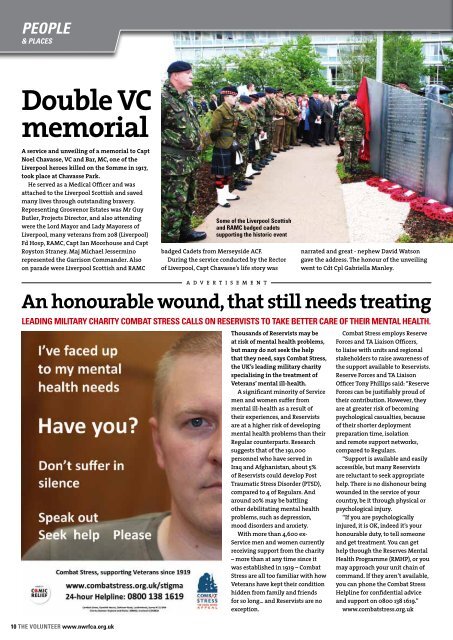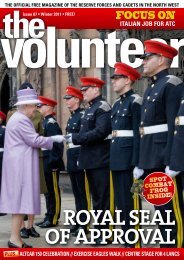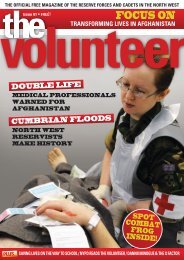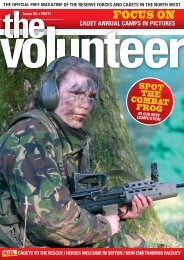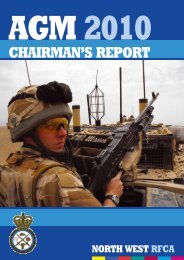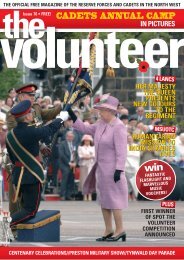Issue 87 - NWRFCA - Northwest Reserve Forces & Cadets Association
Issue 87 - NWRFCA - Northwest Reserve Forces & Cadets Association
Issue 87 - NWRFCA - Northwest Reserve Forces & Cadets Association
You also want an ePaper? Increase the reach of your titles
YUMPU automatically turns print PDFs into web optimized ePapers that Google loves.
People<br />
& places<br />
Double VC<br />
memorial<br />
A service and unveiling of a memorial to Capt<br />
Noel Chavasse, VC and Bar, MC, one of the<br />
Liverpool heroes killed on the Somme in 1917,<br />
took place at Chavasse Park.<br />
He served as a Medical Officer and was<br />
attached to the Liverpool Scottish and saved<br />
many lives through outstanding bravery.<br />
Representing Grosvenor Estates was Mr Guy<br />
Butler, Projects Director, and also attending<br />
were the Lord Mayor and Lady Mayoress of<br />
Liverpool, many veterans from 208 (Liverpool)<br />
Fd Hosp, RAMC, Capt Ian Moorhouse and Capt<br />
Royston Straney. Maj Michael Jessermino<br />
represented the Garrison Commander. Also<br />
on parade were Liverpool Scottish and RAMC<br />
Some of the Liverpool Scottish<br />
and RAMC badged cadets<br />
supporting the historic event<br />
badged <strong>Cadets</strong> from Merseyside ACF.<br />
During the service conducted by the Rector<br />
of Liverpool, Capt Chavasse’s life story was<br />
narrated and great - nephew David Watson<br />
gave the address. The honour of the unveiling<br />
went to Cdt Cpl Gabriella Manley.<br />
a d v e r t i s e m e n t<br />
An honourable wound, that still needs treating<br />
Leading military CHARITy Combat STRESS CALLS on RESERVISTS to take bETTER CARE of THEIR MENTAL HEALTH.<br />
Thousands of Reservists may be<br />
at risk of mental health problems,<br />
but many do not seek the help<br />
that they need, says Combat Stress,<br />
the UK’s leading military charity<br />
specialising in the treatment of<br />
Veterans’ mental ill-health.<br />
A significant minority of Service<br />
men and women suffer from<br />
mental ill-health as a result of<br />
their experiences, and Reservists<br />
are at a higher risk of developing<br />
mental health problems than their<br />
Regular counterparts. Research<br />
suggests that of the 191,000<br />
personnel who have served in<br />
Iraq and Afghanistan, about 5%<br />
of Reservists could develop Post<br />
Traumatic Stress Disorder (PTSD),<br />
compared to 4 of Regulars. And<br />
around 20% may be battling<br />
other debilitating mental health<br />
problems, such as depression,<br />
mood disorders and anxiety.<br />
With more than 4,600 ex-<br />
Service men and women currently<br />
receiving support from the charity<br />
– more than at any time since it<br />
was established in 1919 – Combat<br />
Stress are all too familiar with how<br />
Veterans have kept their condition<br />
hidden from family and friends<br />
for so long... and Reservists are no<br />
exception.<br />
Combat Stress employs <strong>Reserve</strong><br />
<strong>Forces</strong> and TA Liaison Officers,<br />
to liaise with units and regional<br />
stakeholders to raise awareness of<br />
the support available to Reservists.<br />
<strong>Reserve</strong> <strong>Forces</strong> and TA Liaison<br />
Officer Tony Phillips said: “<strong>Reserve</strong><br />
<strong>Forces</strong> can be justifiably proud of<br />
their contribution. However, they<br />
are at greater risk of becoming<br />
psychological casualties, because<br />
of their shorter deployment<br />
preparation time, isolation<br />
and remote support networks,<br />
compared to Regulars.<br />
“Support is available and easily<br />
accessible, but many Reservists<br />
are reluctant to seek appropriate<br />
help. There is no dishonour being<br />
wounded in the service of your<br />
country, be it through physical or<br />
psychological injury.<br />
“If you are psychologically<br />
injured, it is OK, indeed it’s your<br />
honourable duty, to tell someone<br />
and get treatment. You can get<br />
help through the <strong>Reserve</strong>s Mental<br />
Health Programme (RMHP), or you<br />
may approach your unit chain of<br />
command. If they aren’t available,<br />
you can phone the Combat Stress<br />
Helpline for confidential advice<br />
and support on 0800 138 1619.”<br />
www.combatstress.org.uk<br />
10 the volunteer www.nwrfca.org.uk


